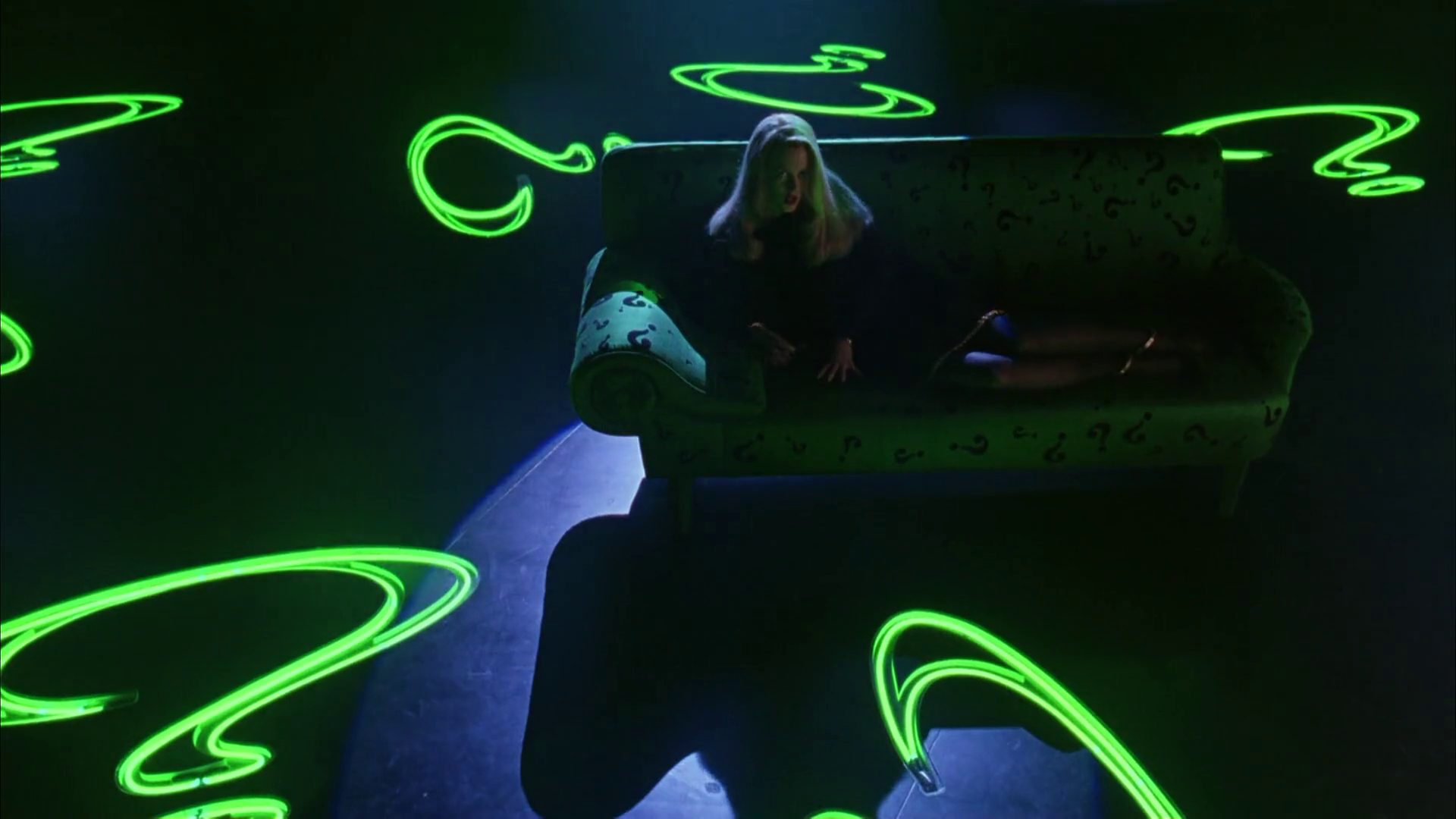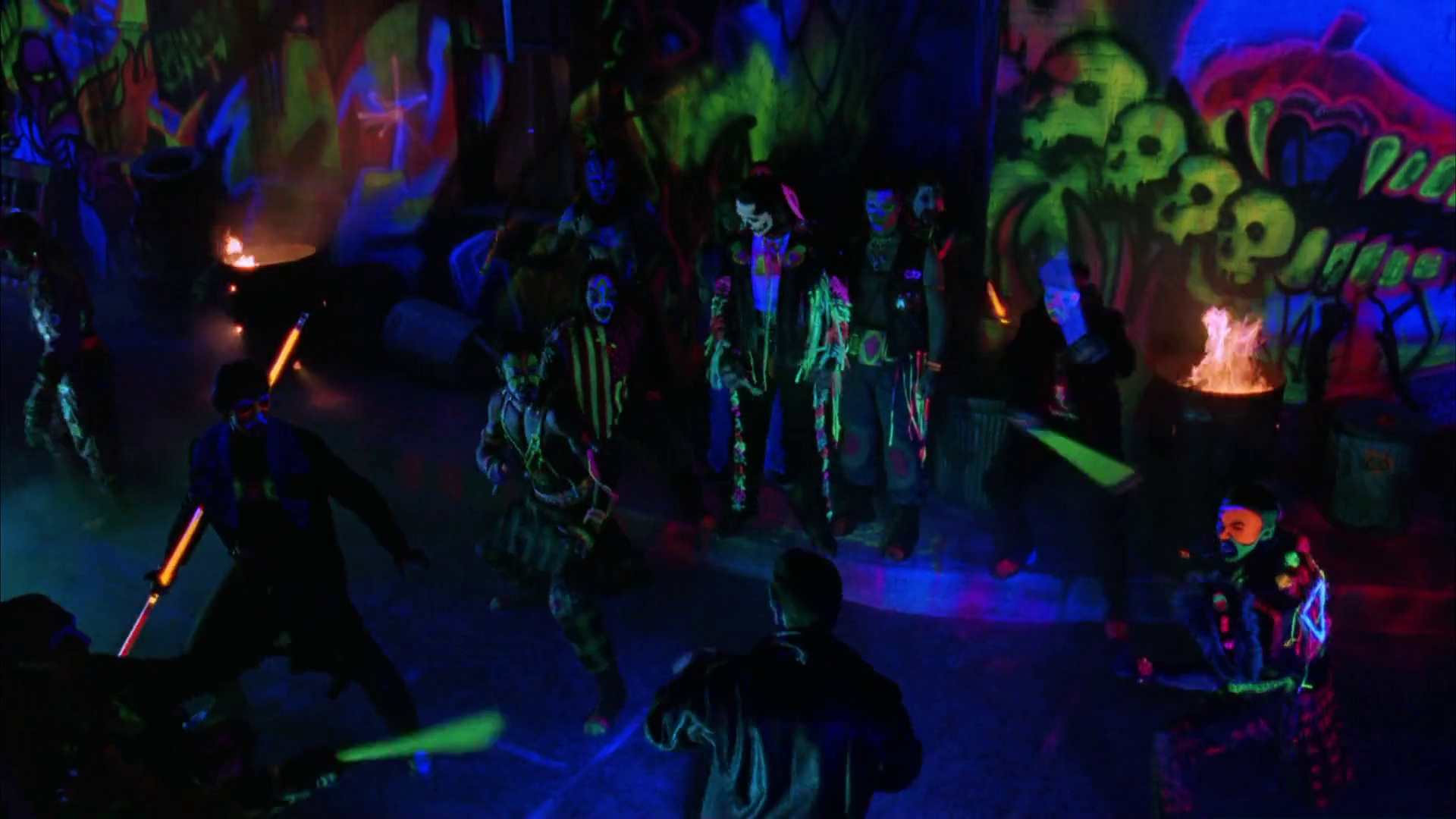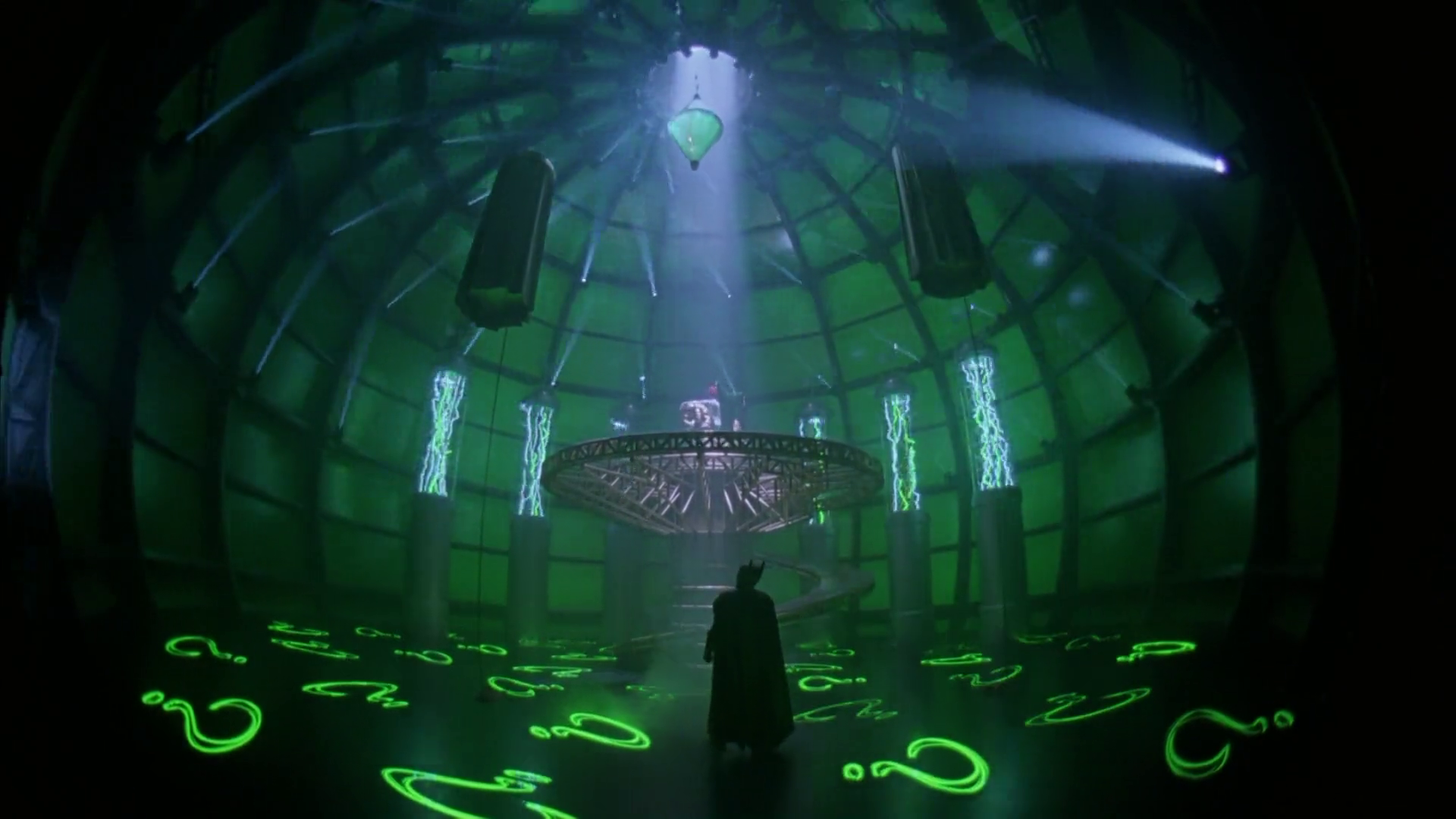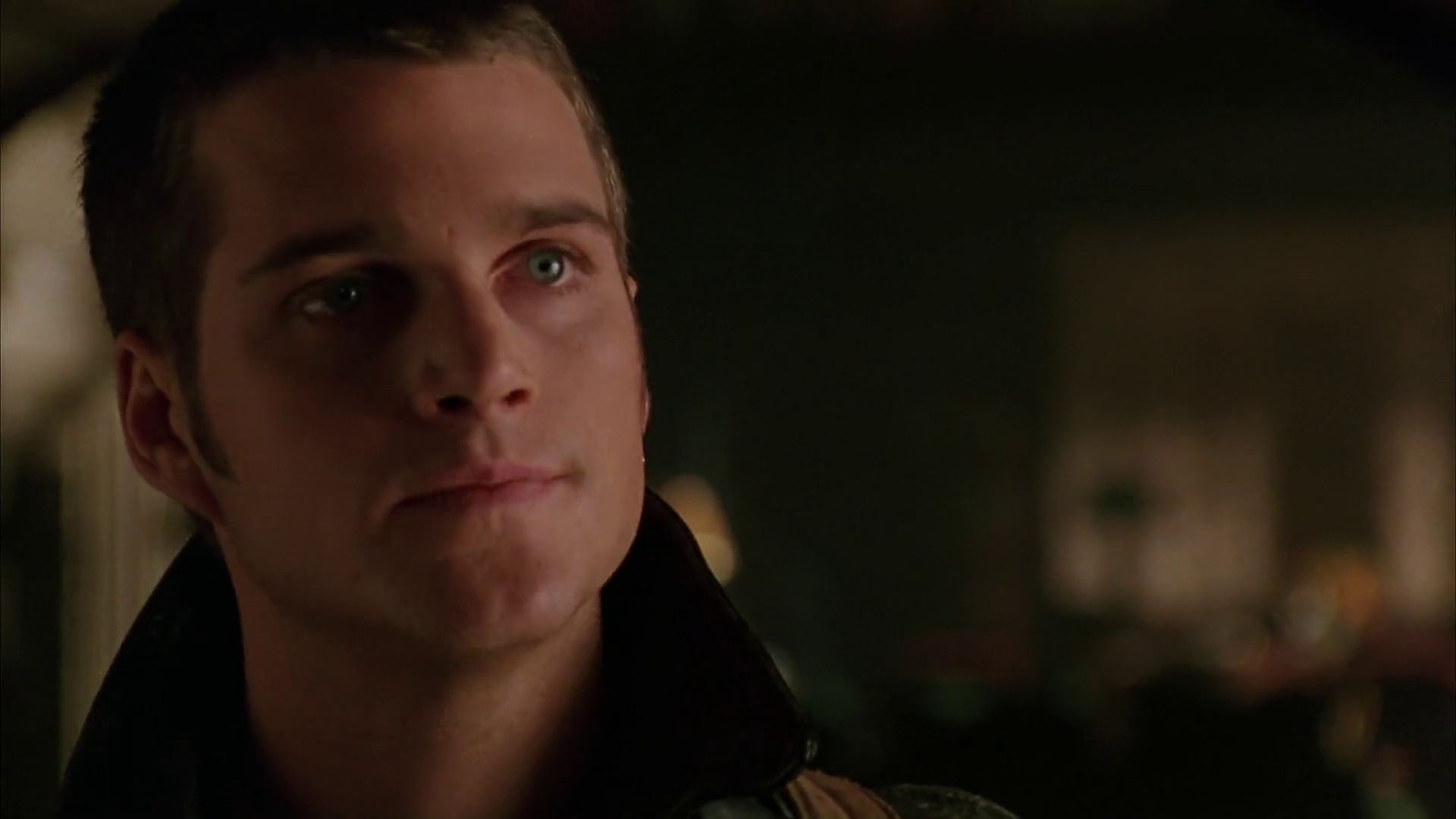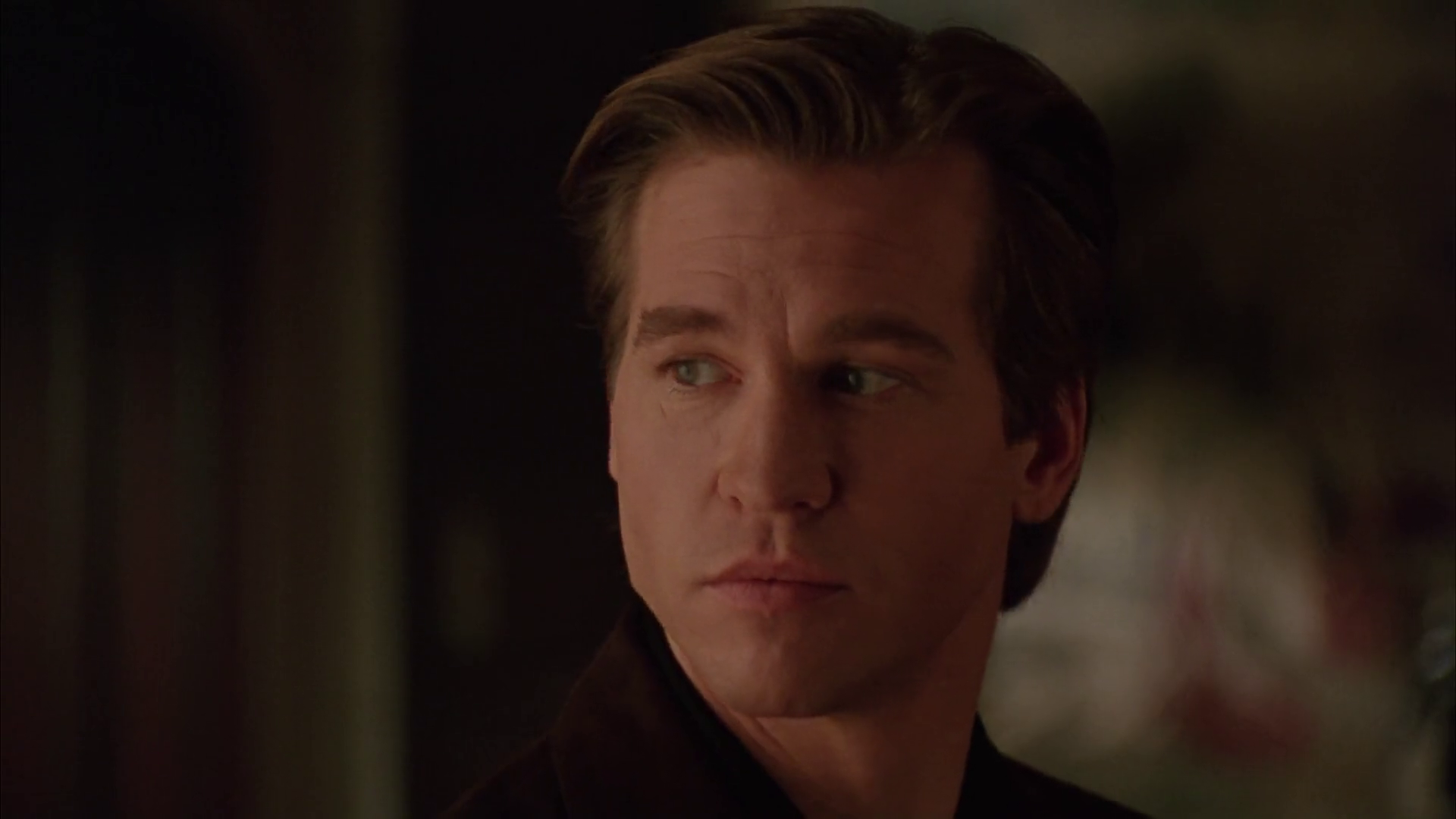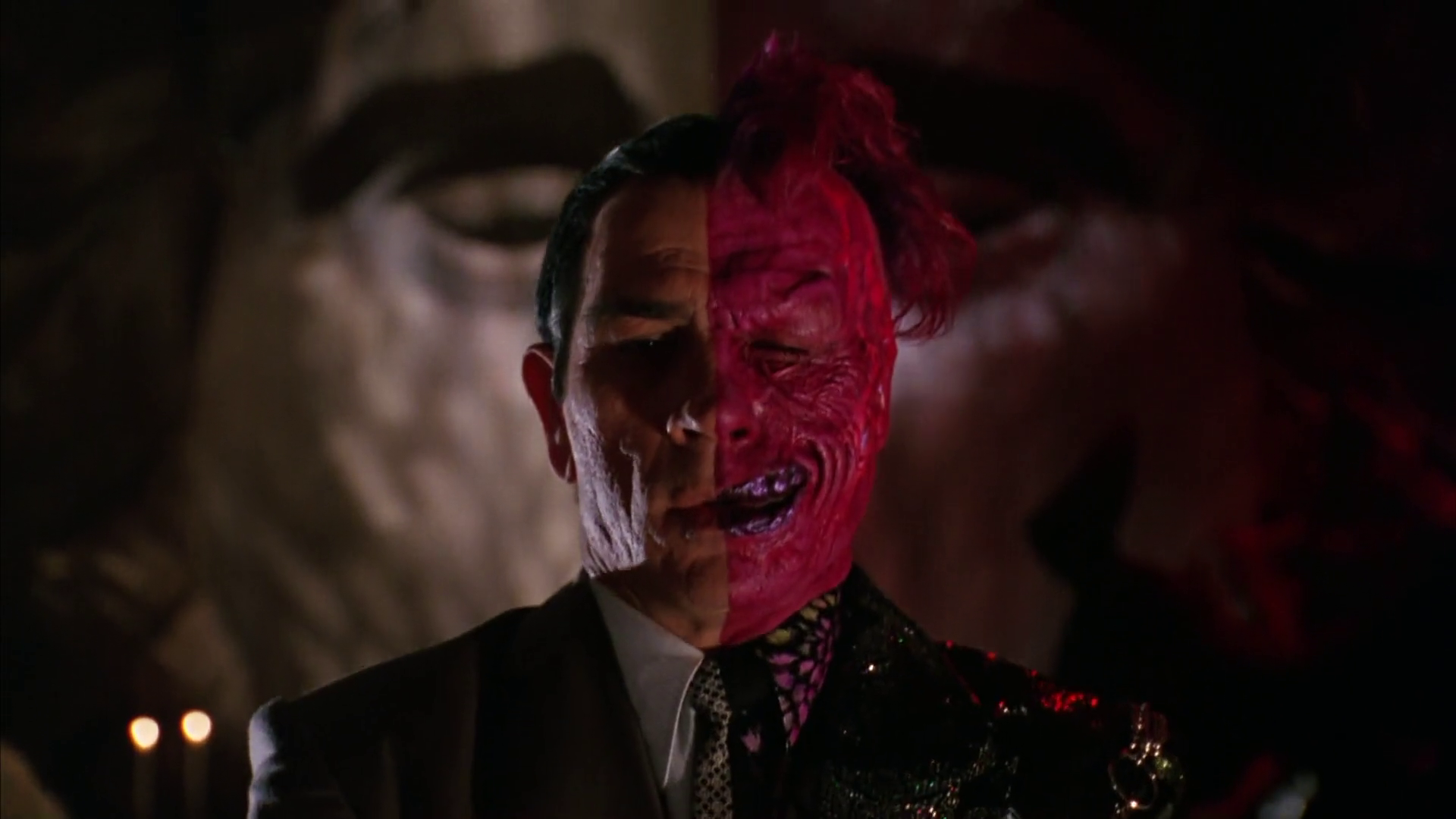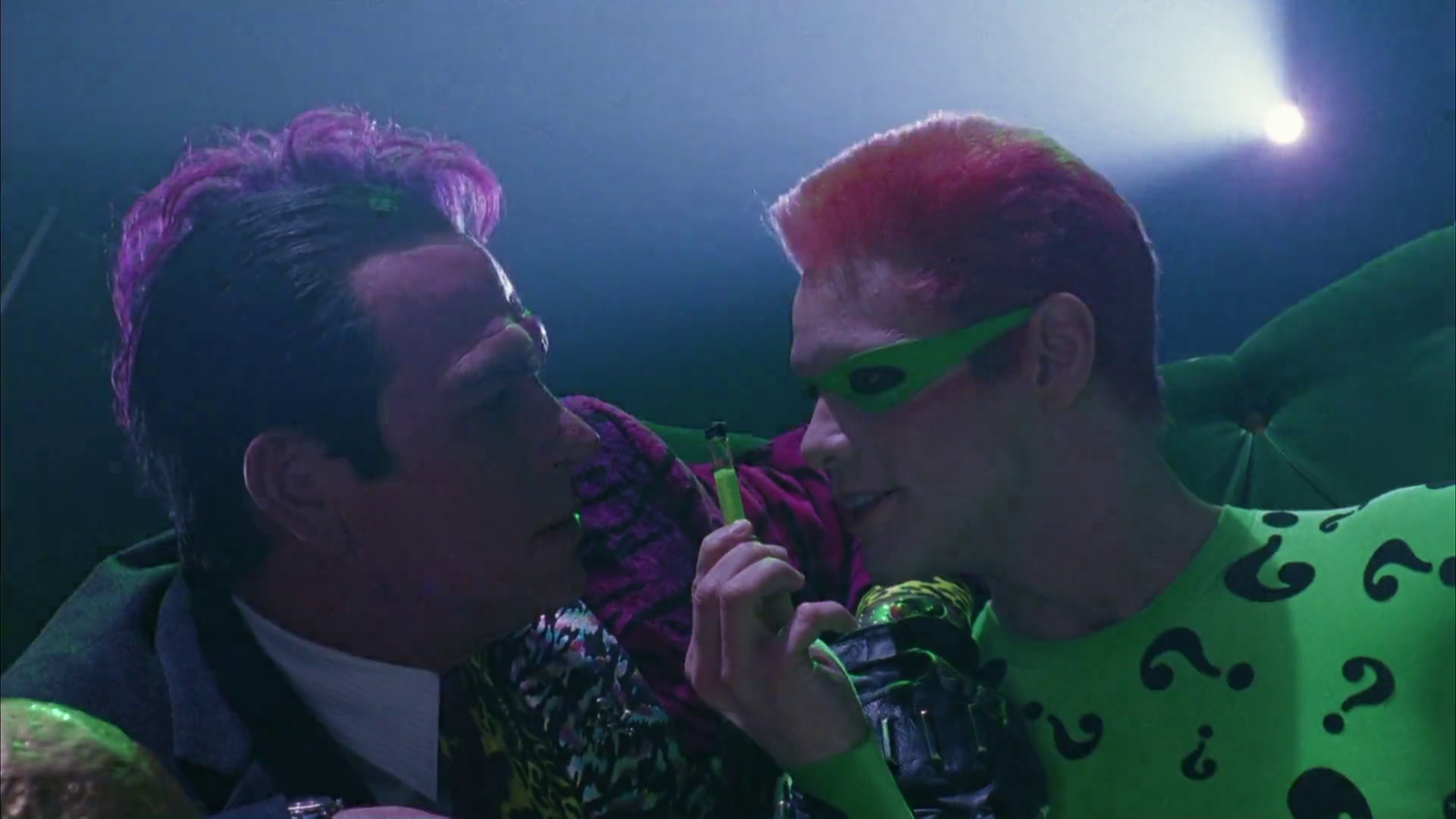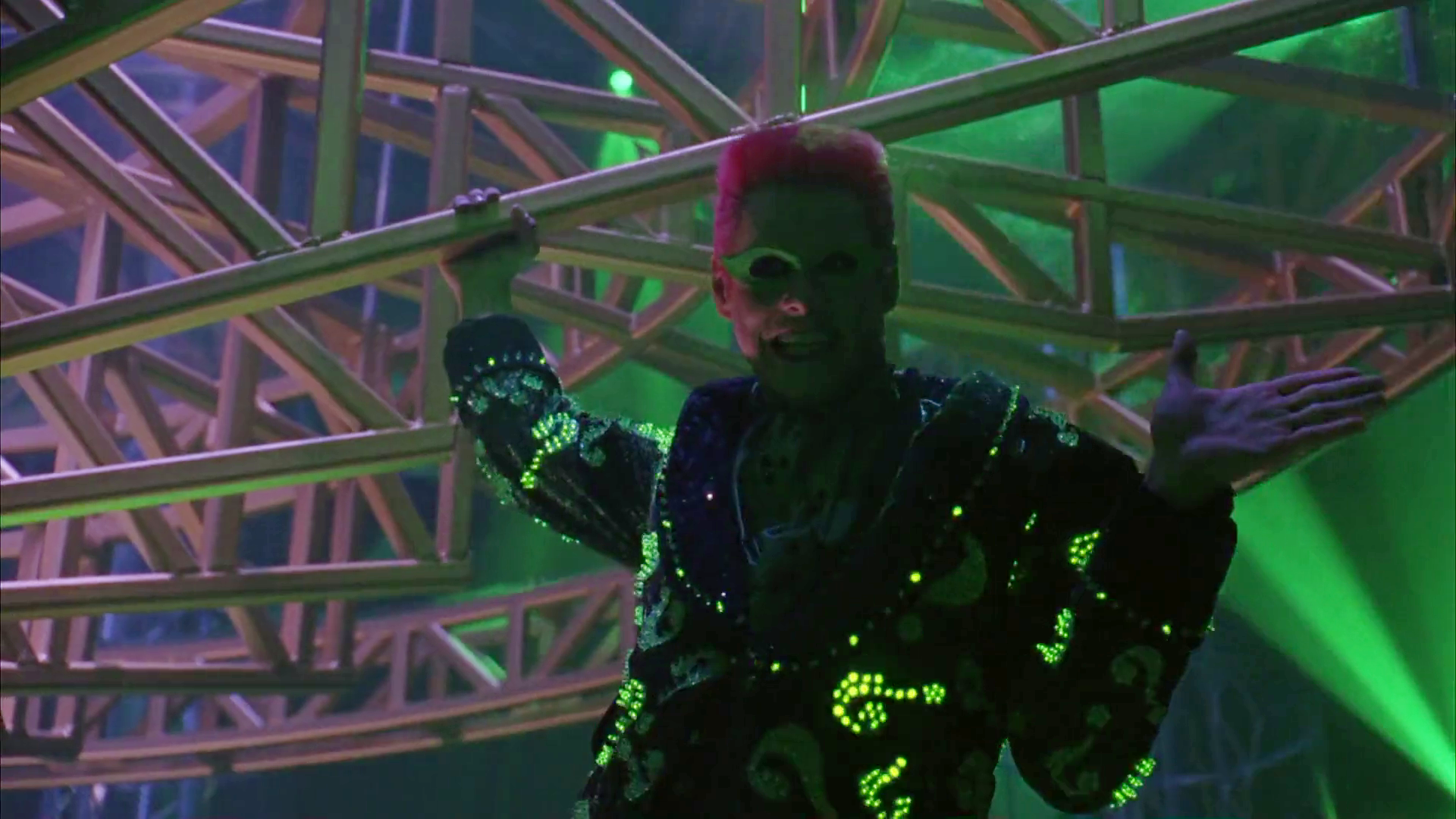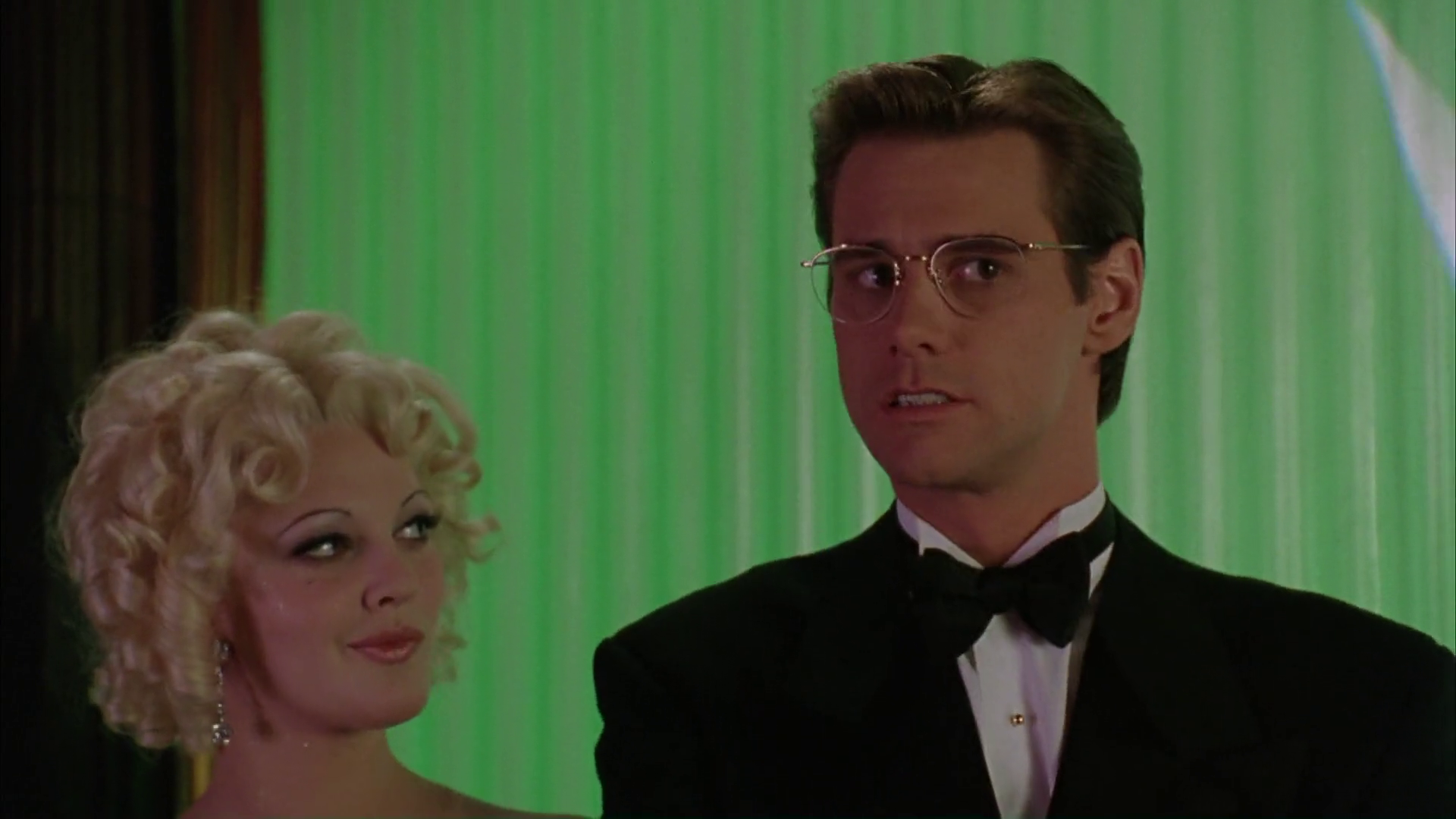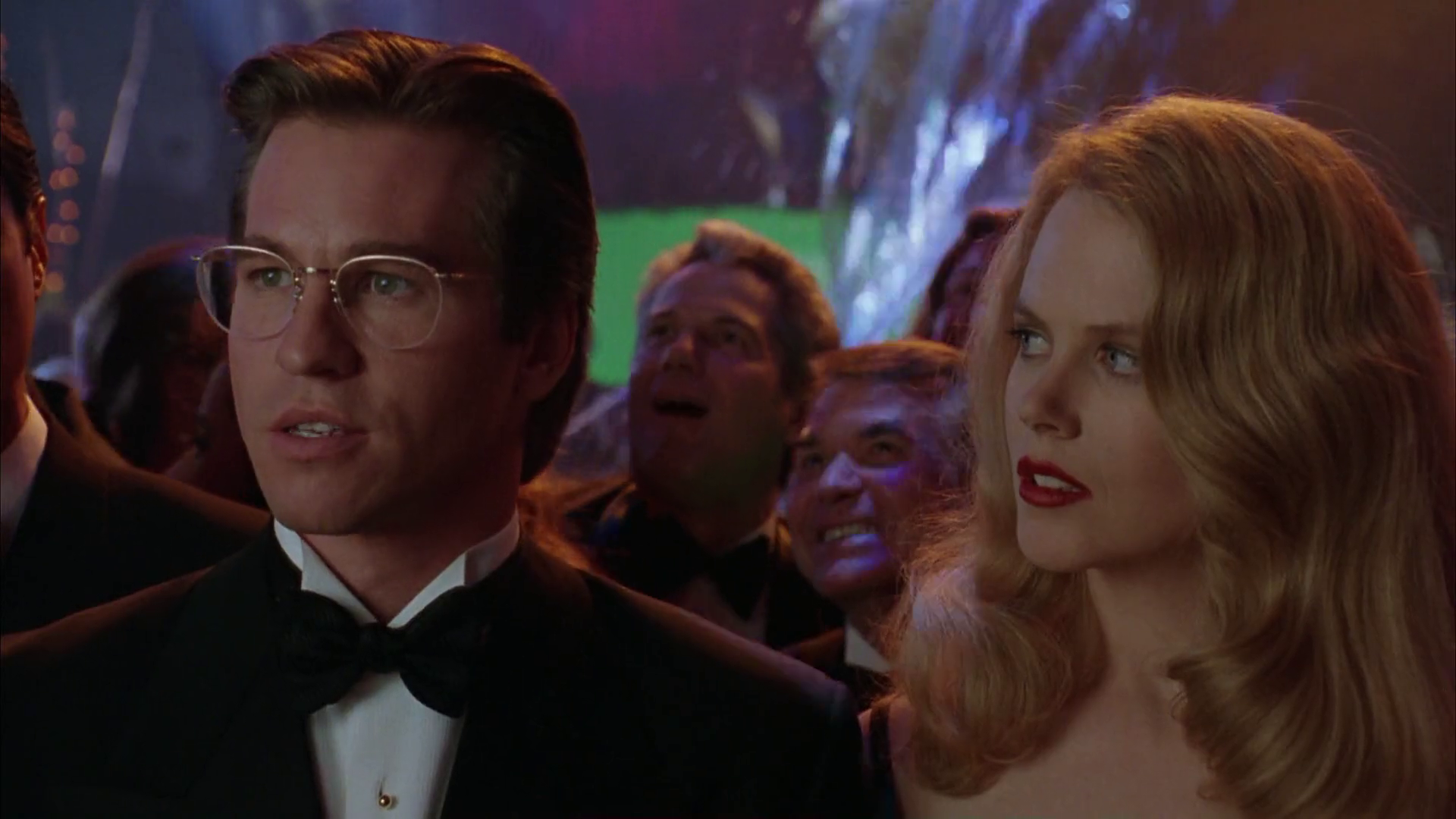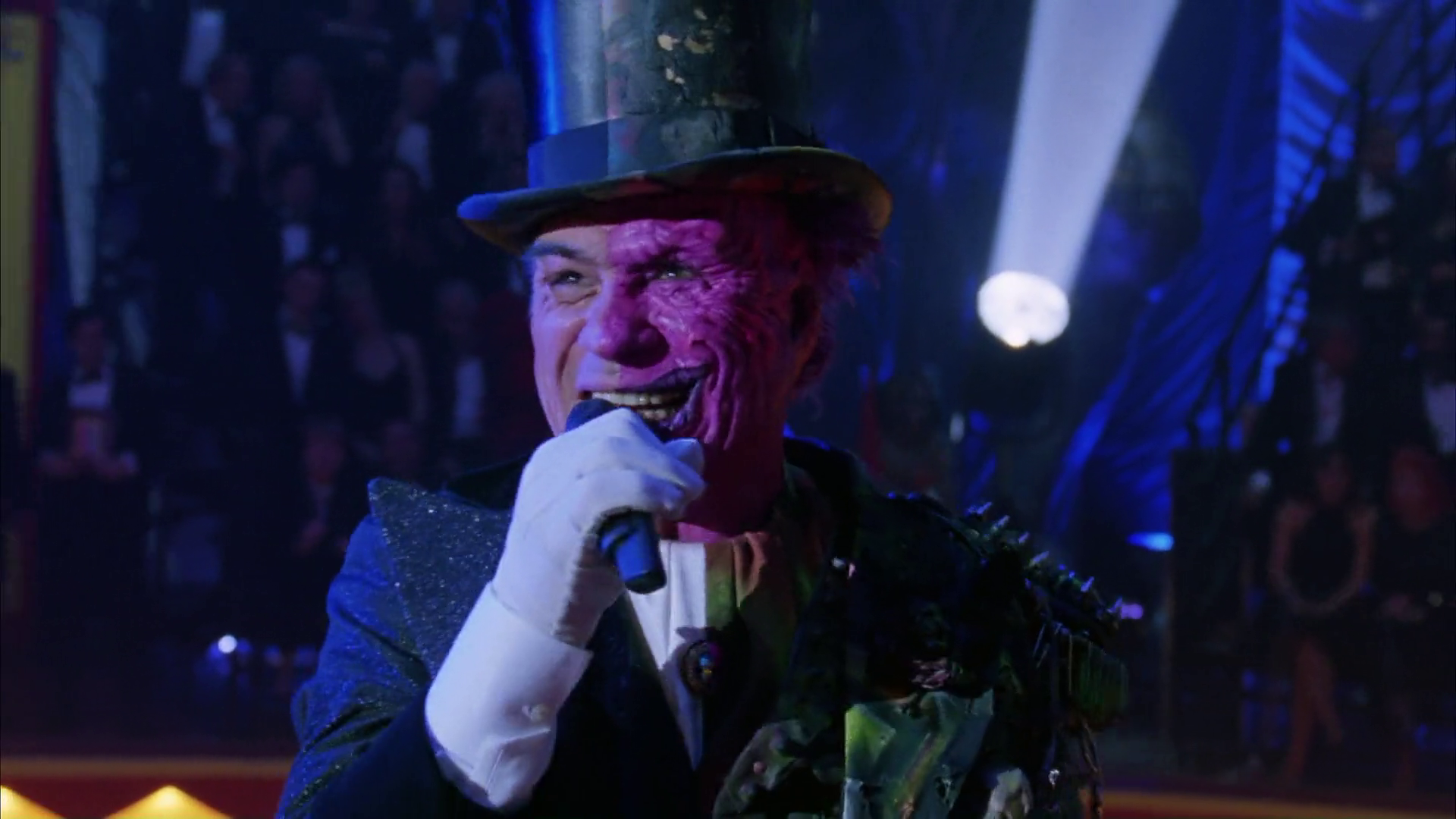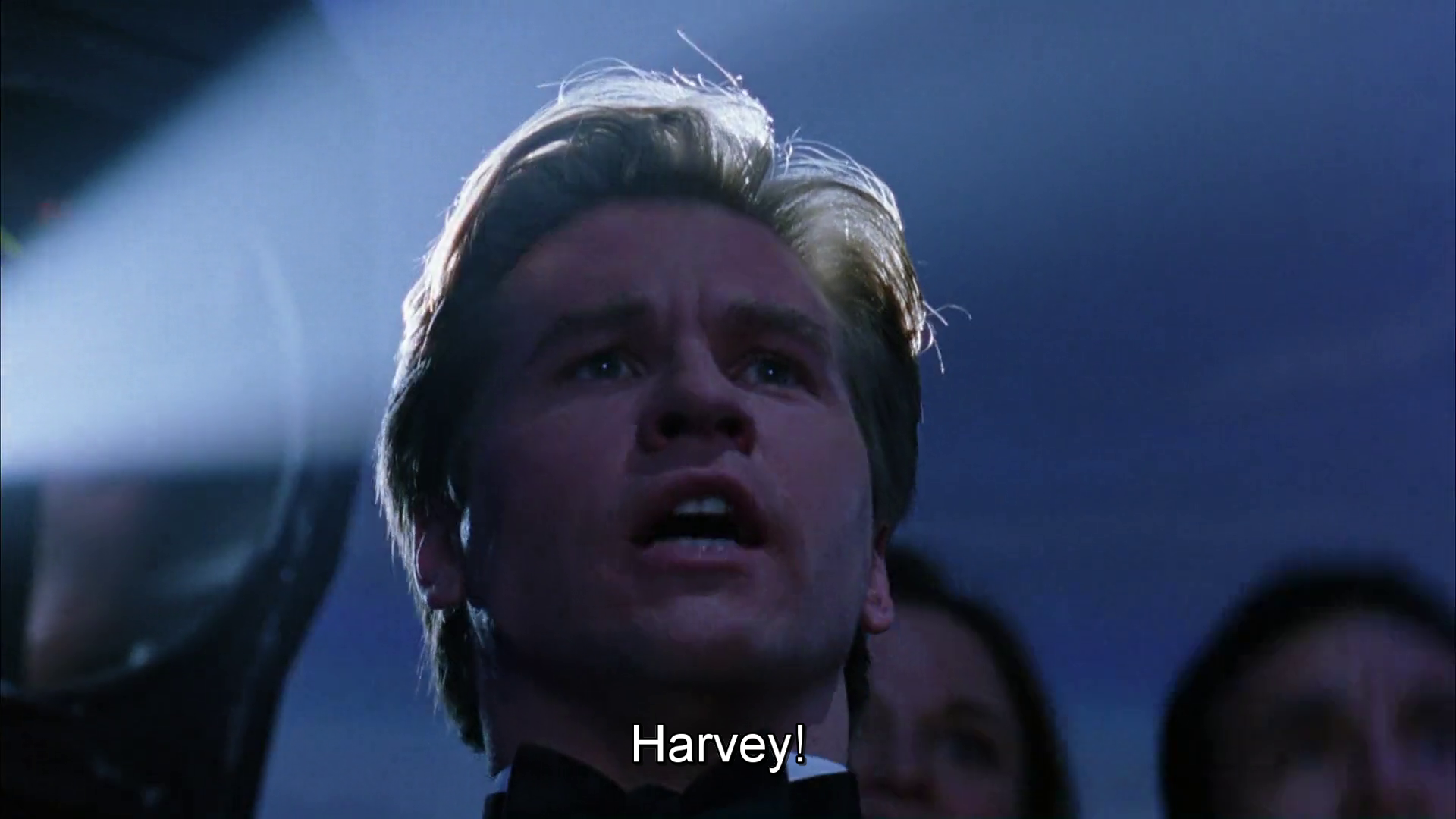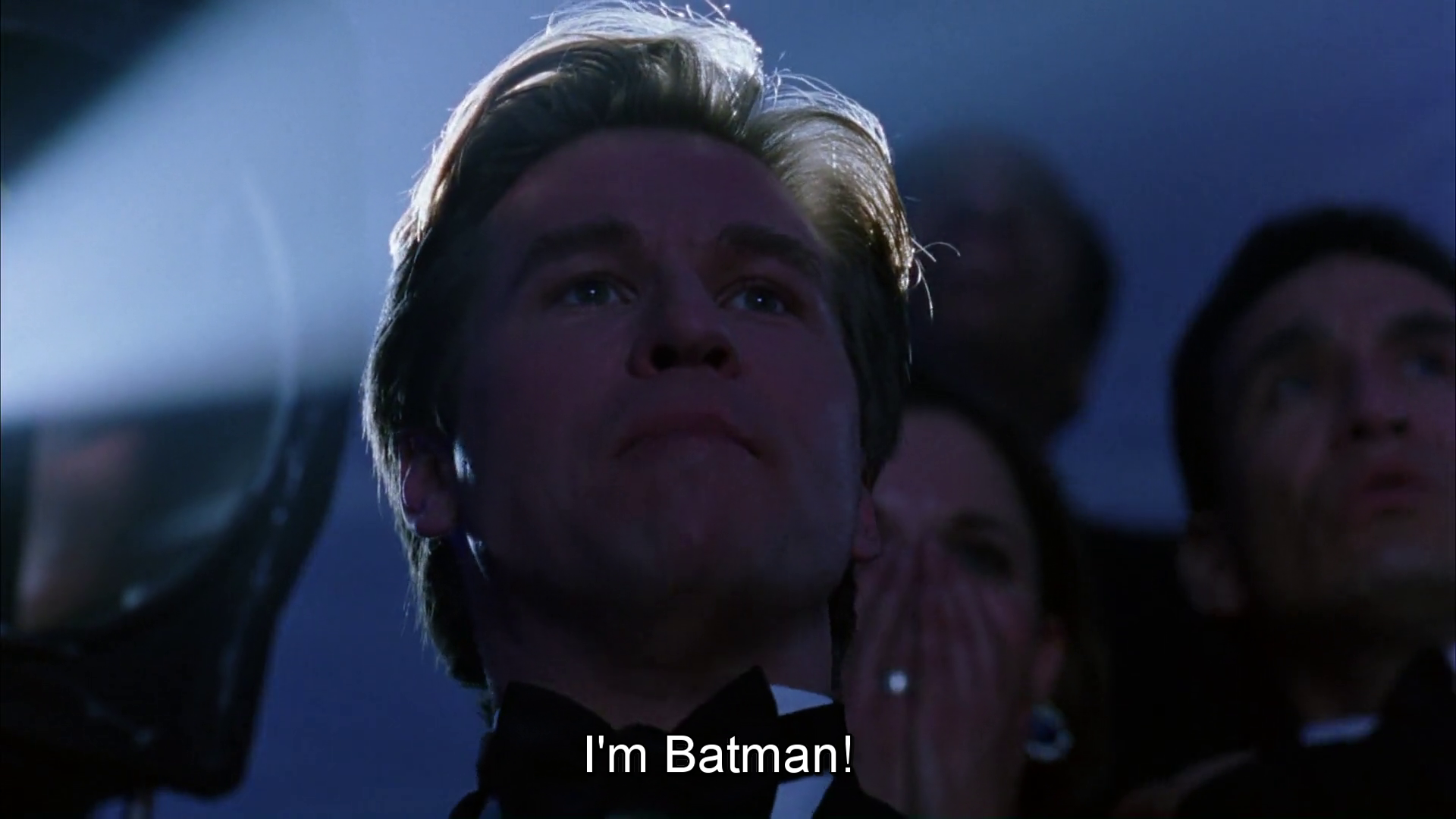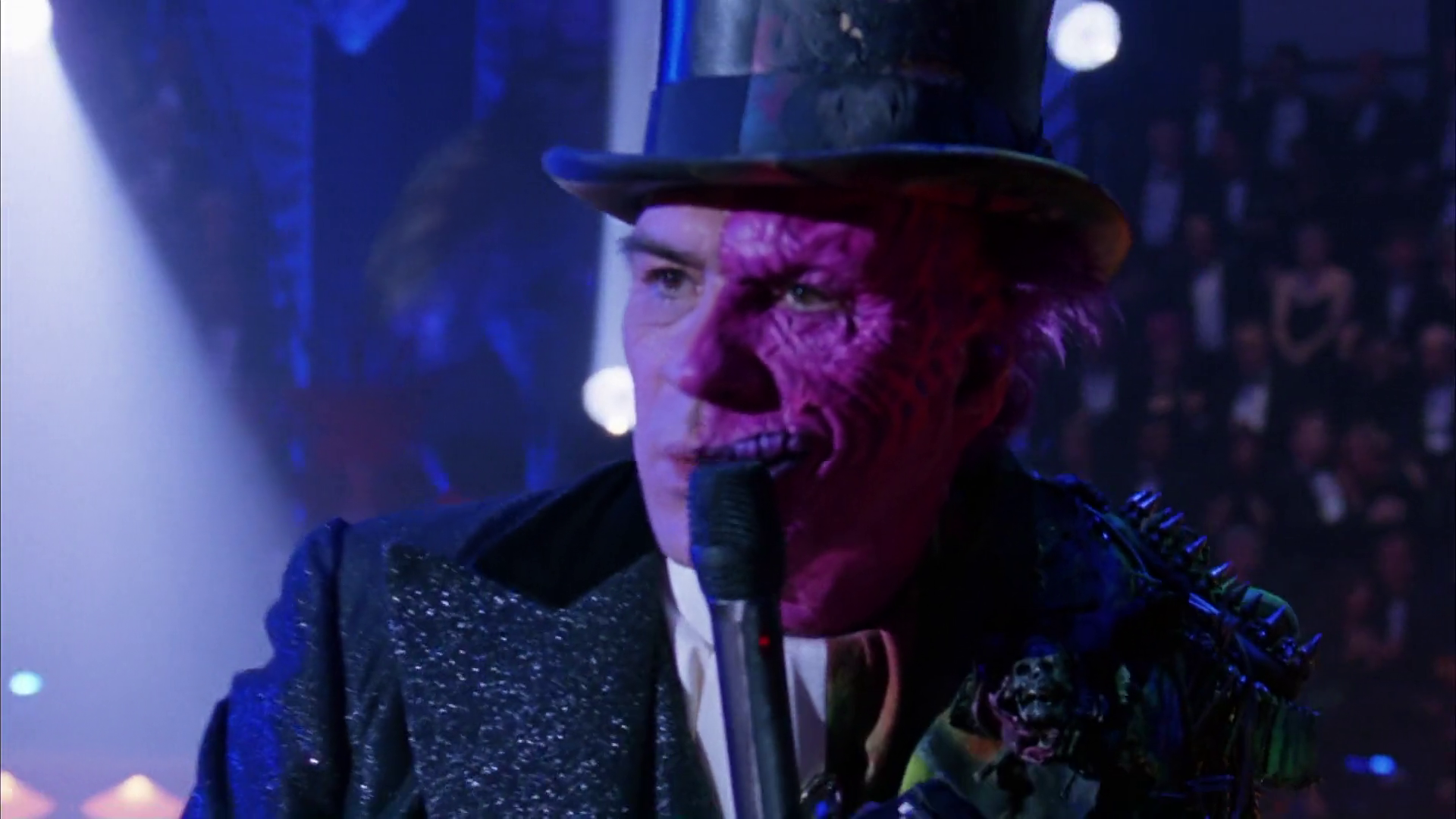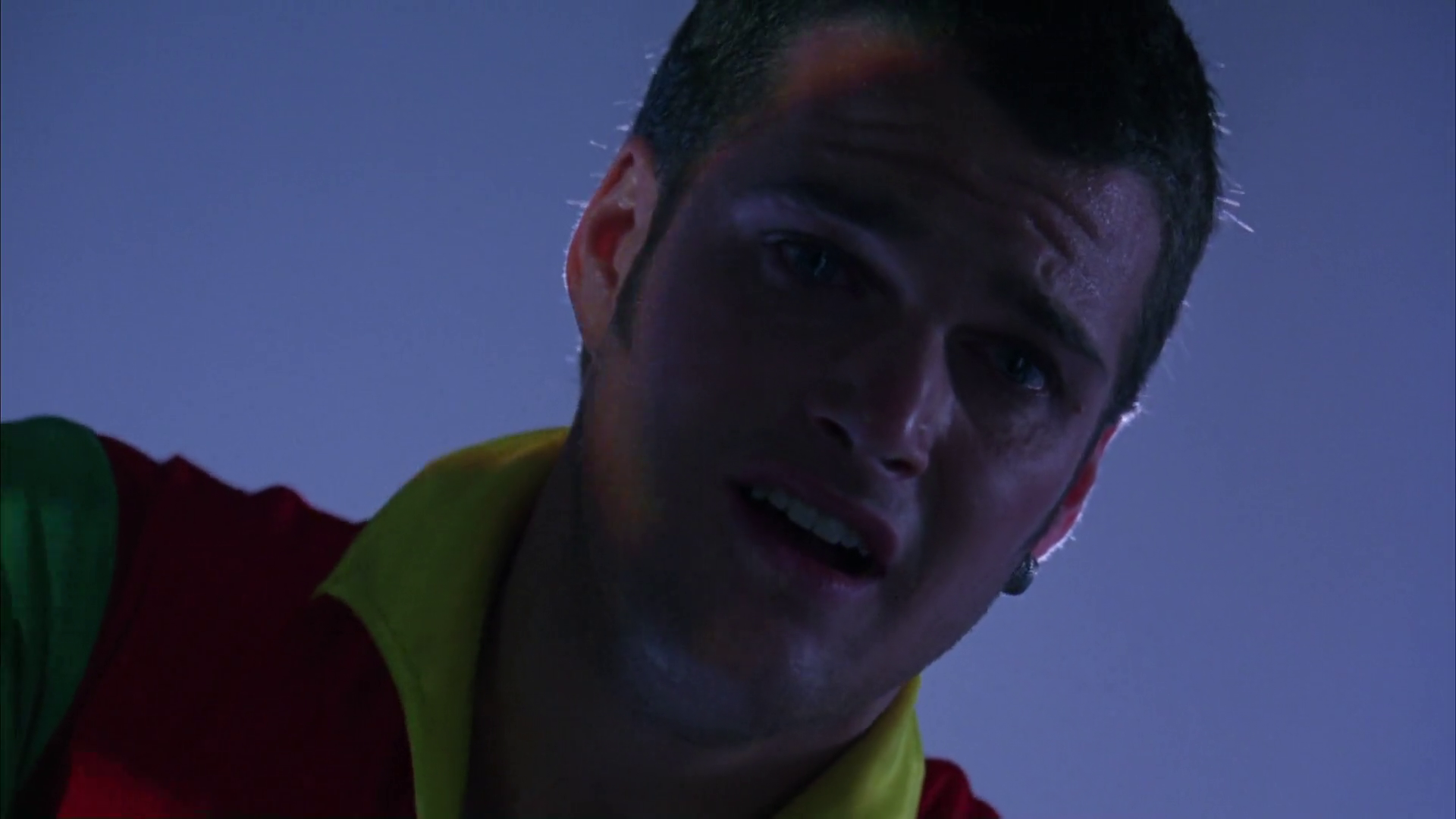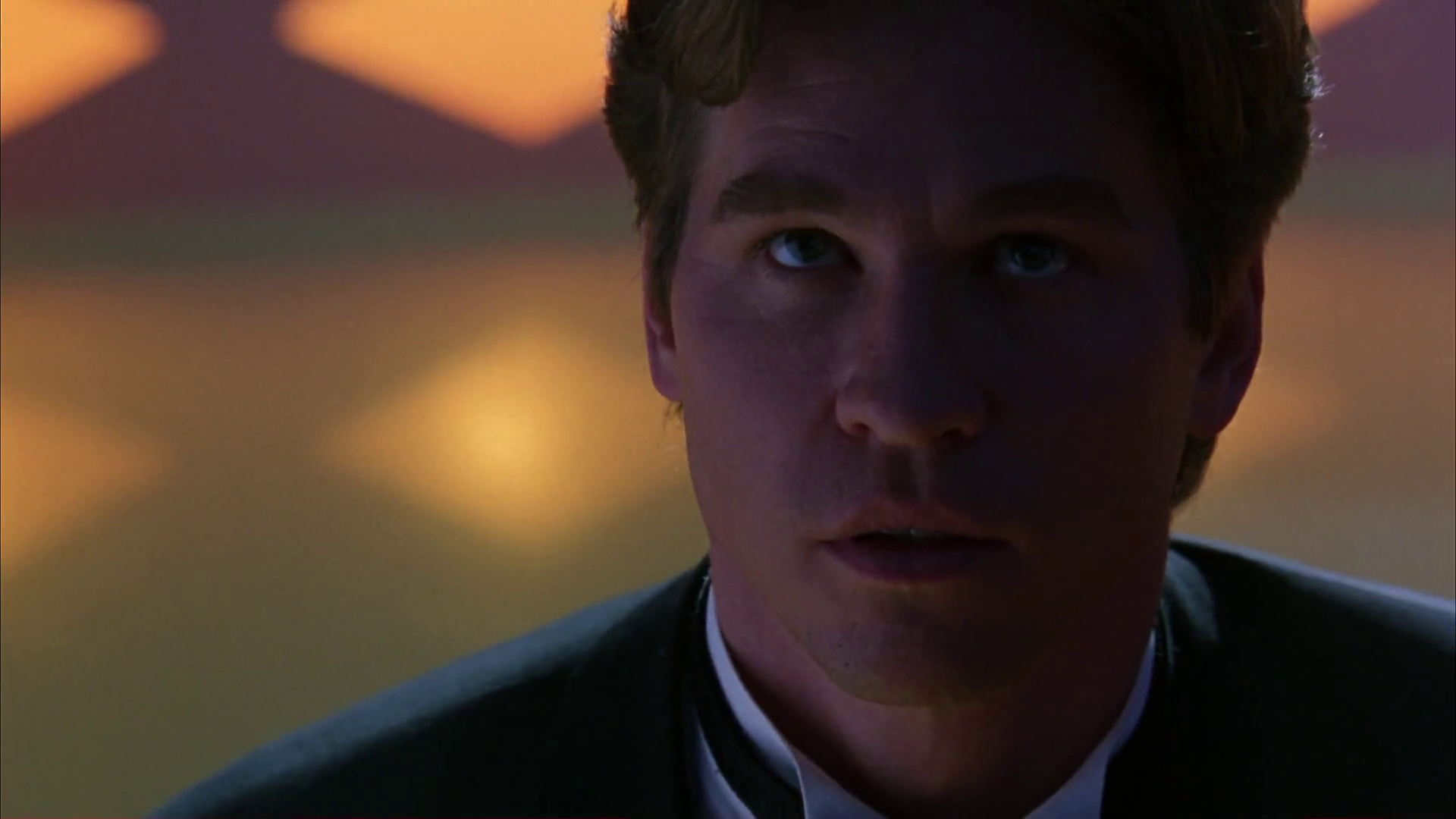Batman Forever (1995)
Written by: Lee Batchler, Janet Scott Batchler, and Akiva Goldsman
Starring: Val Kilmer, Nicole Kidman, Tommy Lee Jones, Jim Carrey, and Chris O'Donnell
I can understand why you might hire Joel Schumacher to make a superhero movie, especially a Batman movie, especially in the '90s, especially coming off Tim Burton's grim and gothic Batman movies. I can understand how, as a studio, looking at the style of Burton's very successful films but wanting to make them a little more kid-friendly, for money reasons, you might think, uh, Joel Schumacher can do that. I'm also willing to say that, uh, he did.
This is the 10th movie of his directorial career, and by now we know that Schumacher knows how to deliver on what's asked of him. He can match style and genre. In this case, it's clear he was asked to lighten things up and make Batman a little more fun. And so, he did. Maybe a little more restraint would have been good, but restraint ain't exactly Joel's style. Everything in Batman Forever is loud and bright and extreme. It very much has the look and shape of a comic book-- from the bright colors to the posing. If you took any random shot from this movie and looked at it as a still picture, each one would be gorgeous and neo-futurist. In motion, it's a little harder to enjoy. It's just... a lot, and it doesn't all serve the greater story at play.
The German Expressionist style of Gotham city is a heightened version of Burton's noir vision of the town, with added neon and day-glo ever present. Where Burton films his abstract world with steady camera moves and simple action, every other shot in Batman Forever is at a sharp dutch angle, or is a swerving movement. It's like being on a roller coaster, and eventually, especially coupled with the extreme and vibrant coloration, it becomes overwhelming. As Roger Ebert noted, "There is no rhythm to the movie, no ebb and flow; it's all flat-out spectacle." The spectacle is great, but it's a case of, when everything is spectacle, nothing is spectacle. I would say that occasionally things settle down, and the movie ebbs enough to become watchable and enjoyable. Most of the scenes at Wayne Manor achieve this, especially the quieter moments between Bruce Wayne and Dick Grayson, as they wrangle the terms of their little partnership.
Much of this comes down to the actors-- Val Kilmer and Chris O'Donnell are giving the best and most grounded performances in the movie. Kilmer, as Batman, is stoic and stiff. As Bruce Wayne, he's stiff but gentle. Not as doofy and stilted as Michael Keaton, Kilmer has a smoothness to him as Bruce Wayne that I really liked. He carries the stiff physicality of Batman with him throughout the film, always executing full body turns. He looks good in a suit, carries the hair well, and wears Bruce's reading glasses very nicely. He looks like both billionaire playboy and vigilante, and he carries the weight of guilt and tragedy visibly on his shoulders. For all the duality talk inherent in Batman stories, Kilmer reads as a settled, integrated person. He is both Batman and Bruce Wayne because he "chooses to be" both, a sentiment I actually really love. And, I should say, he pulls off the Batsuit well too-- as cinematographer Stephen Greenblat has said, "Val Kilmer was the most beautiful Batman. The perfect face for that mask. Those lips." No kidding. Maybe the Batsuit itself is all codpiece and sculpted chest and butt, but Kilmer looks good in it! So!
O'Donnell, the original superhero Chris, was 25 in this movie and definitely looks and reads as too old for Boy Wonder Dick Grayson, but his performance is light and boyish, buoyant and angst-ridden in appropriate turns. He's surprisingly charming. Not a boy, barely a teenager, but a nice young man with a rebellious streak, clearly in need of guidance. It's to the benefit of the movie that that reads. I actually really liked him in this movie. This is right in the Chris O'Donnell moment and I can see why he was such a star for a period. He has a real glittering presence. And he looks very cute in the final Robin suit! The little collar, the domino mask. He's happy to be in it and it works. It's cute and I like him, so there.
In the same way most of Tim Burton's movies are about weirdos who live outside society's acceptance, and his Batman movies reflect that, so too does this Batman movie reflect Schumacher's personal interest in non-traditional, self-made families. Thematically, most of this movie is as much about kinship as it's about that classic Batman motif: duality. Those are the two things that keep coming up, reflected and refracted in the narrative and characters. It's a good thought, appropriate for Batman stories in general, and for the two villains in the movie.
The structural element of the villains is very sharp-- that Two Face and the Riddler essentially exist as villains to Batman and Bruce Wayne respectively, individually. That's pretty cool, conceptually. This movie uses the inherent duality which is such a huge theme in Batman in general to excellent effect. Couching the Riddler's terrorism in a deeply felt need to be recognized as brilliant isn't anything new, but to pair it with a need for kinship ("I thought you'd understand," he whimpers at Bruce Wayne upon first rejection) is pretty interesting stuff. It ties in to the general familial theme, and again to Schumacher's interest in self-made groups. You get the sense he really just needs a friend or a lover or a partner of any kind, and he might get his shit under control. Bruce Wayne, brilliant and secretive, is a character who occasionally veers into creepy isolation, and needs his little family to keep him good and connected to humanity. Alfred and Dick help him be a person, not just a Batman. Nygma probably needs that too. Bruce gets it, and wins the day. Nygma doesn't, and fries. Meanwhile, Two Face embodies the kind of evil mirror to Batman-- his twisted dedication to justice and fair play embodied by the scarred coin who's lucky flip he follows (or cheats, flipping again and again until he gets the result he wants). Both villains have a sense of fair play that goes along with Batman/Bruce's genuine sense of righteousness, but their sense of it is twisted and deformed. One of my favorite things in the comics is that both Two Face and the Riddler can be (and often are) defeated by their need to follow their own rules. As Batman Forever acknowledges, Two Face's commitment to the toss of the coin can be exploited. So too can the Riddler be stumped into submission by a trick puzzle.
Conceptually that's all well and good; conceptually, I love it. In execution, however, unfortunately, something fails. In the way that the performances make Bruce and Dick work decently well, I think here the performances of Tommy Lee Jones and Jim Carrey fail, and undercut the cool aspects of these ideas.
One truly, genuinely great thing this movie gave us is the infamous quote from Tommy Lee Jones to Jim Carrey, where he notably said, "I hate you. I really don't like you ... I cannot sanction your buffoonery." Iconic. Unreal. Remarkable. I too admit that I cannot sanction his buffoonery, and I found his take on the Riddler particularly exhausting. I'm capable of liking Jim Carrey (and, especially when he was young, I find him to be actually startlingly good-looking when he isn't busy contorting his face into grotesque shapes), and the Riddler is my favorite Batman villain. And you know, I can even get behind buffoonery sometimes. In this case, Carrey does too much too often, without pause or reprieve, and the end result is a non-stop barrage of schtick. It's ugly, and doesn't provide much humor or interest. It's just... Jim Carrey doing Jim Carrey, most of the time, which is... eh. Carrey does his best out of the Riddler suit, displaying damaged, fragile neediness in his earliest scenes (though he could use to tone down even more, so there was more room to ramp up). I think his best work is in the scene where Nygma hosts a party for his new tech company, while trying to steal thoughts out of the heads of the elite. Here, Nygma is copying everything about Bruce Wayne from his hair (identical color, identical style) to his suit (an identical tuxedo), to even putting on and taking off a pair of wire-rim glasses as Bruce does it. It's not commented on, but it's a nice touch, and it's deeply pathetic. Carrey doesn't shy away from how desperate Nygma is in that scene, and his pent up energy works, for that moment, in the favor of the film. He's also not styled as a cartoon or in a situation which allows for a total cartoon performance, and so we are saved from that. It's a nice reprieve, and a glimpse at something more grounded. But alas.
Tommy Lee Jones himself doesn't fare much better, turning in his own brand of buffoonery. He's a cackling lunatic for most of the movie, and while Jones commits to this with admirable aplomb, it feels like a waste of a character with a complicated and nuanced backstory, and one that Jones could have brought real grit to. Nevertheless, there are still a couple good moments. Tommy Lee Jones modulates down sometimes, to best effect when he crashes the benefit circus and Nygma's party, and in the fight with Robin at the end. The more manic insanity doesn't sit well on him, and comes across as foolish more than frightening.
And this isn't even to mention Nicole Kidman, who is doing a wild, breathy performance as a psychologist who's also.... a..... sex fiend.
But there's good stuff in Batman Forever, and the good stuff is indeed pretty good! Schumacher isn't a great director of action (though he sure knows how to shoot the swirling of a cape), and most of it is a little muddled, but sequences like Dick's joyride in the Batmobile, or Two Face crashing the circus work, very well. Maybe what it is is that action for the sake of action is hard for Schumacher-- fight scenes, car chases, etc. Filming hand-to-hand combat is hard for most directors, and it's definitely not Schumacher's strongest suit. But he has a good eye for story, and so in that circus sequence, he's following three separate plots and that action is clear and tensely drawn. In one, Dick Grayson tries to get a bomb outside the building. In another, Bruce Wayne tries to stop Two Face from killing people. In a third, Two Face wrecks havoc. It's a sequence that builds clearly, and then crashes down as Two Face kills Dick's family. The build of action and color snap to dark shadows and a tragic, tender shot of Val Kilmer, grieving that he couldn't save people. It's successful, tense, exciting, and effective. It's quick work well done.
Most of the action sequences are quick and tidy-- I'll give the movie credit for being lean. If it's ever indulgent, it's in the outlandish performances from Carrey and Jones, and perhaps in the whirling wheeling production design. Mostly it's tight and tidy. It gets the job done.
So this movie is certainly more fun (bright, playful, silly) than Burton's Batman films (and I do prefer fun in my superhero movies), but it's also just... not as good. The story is weaker, the villains are less successful, less threatening and frightful, less engaging, less explored. It's less thematically rich, and it is too colorful, a thing I ought never to say, but the dreamy quality that allows comic book movies to track despite funny logic is here turned into a sort of nightmare fever dream. While I applaud it's garishness, and the audacity required to be so garish, it's just hard on the eyes, and for a visual medium, that's a knock against it. While I'd rather have this than a dour, grimdark Batman movie (cough cough Chris Nolan no thanks cough cough), I was startled by how much I didn't enjoy watching it. I thought I would find some camp fun in it and get caught up in the whirling whoopsie of it all-- and there are moments that achieved that, certainly. But the balance feels off for an overall enjoyable product. I wanted to like it more, because there are so many ideas in it I like and concepts I can get behind.
For all the shit this movie gets and that Schumacher gets for it, I think I'll always sortof like this movie. I know I said I didn't enjoy watching it, and that's true, but somehow I nevertheless... kind of like it. Maybe it's mostly nostalgia. This movie, and Batman & Robin, came to me at a time when I was hot on Batman as a property, and as a child, these kid-friendly movies totally worked for me. Shortly thereafter, the animated series would win out, and it still stands as my favorite (and the best) version of Batman, and it's been a long time since even then. Meanwhile, I grew up. My critical brain has dulled that edge of enjoyment a bit, clearly, but I'll always appreciate a movie that has all my favorite Batman characters in it, and then goes hell for leather towards crazytown. I'll always love a movie that has colors in it, and takes chances, and tries things, even if those things turn out weird and silly and bad. So I vacillate on this one. In the moment, I didn't enjoy watching it. In hindsight, I feel pretty warmly towards it. Interpret that as you will. I think it's partially dependent on how deeply harmless the movie is. It may not be great, but it's not hurting anyone, so I can't hate it. There are movies that are actively toxic-- including plenty of action movies and superhero angstfests-- but Batman Forever is just a little dumb. And a little dumb is okay.
Overall: ★ ★
Schumacherness: ★ ★ ★ ★
Up next: A Time to Kill (1996)
(PS: Speaking of little families, I'd like to give a little shout out to Kimberly Scott, who in this movie plays Bruce Wayne's secretary in a couple scenes. She's also in Flatliners, as Winnie Hicks, and Falling Down, as a detective, and The Client. She'll go on to appear in Batman & Robin, too. Schumacher clearly liked working with her and brought her along on subsequent projects. He worked with Akiva Goldsman on four movies in a row. He's clearly a man who built a little film family. That is... so honking nice.)

